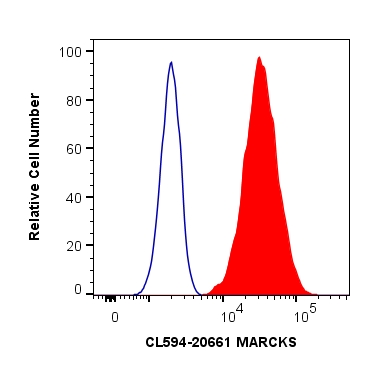验证数据展示
经过测试的应用
| Positive FC (Intra) detected in | HeLa cells |
For other applications, we recommend the unconjugated version of this antibody, 20661-1-AP
推荐稀释比
| 应用 | 推荐稀释比 |
|---|---|
| Flow Cytometry (FC) (INTRA) | FC (INTRA) : 0.40 ug per 10^6 cells in a 100 µl suspension |
| It is recommended that this reagent should be titrated in each testing system to obtain optimal results. | |
| Sample-dependent, Check data in validation data gallery. | |
产品信息
CL594-20661 targets MARCKS in FC (Intra) applications and shows reactivity with human, mouse, rat samples.
| 经测试应用 | FC (Intra) Application Description |
| 经测试反应性 | human, mouse, rat |
| 免疫原 | Peptide 种属同源性预测 |
| 宿主/亚型 | Rabbit / IgG |
| 抗体类别 | Polyclonal |
| 产品类型 | Antibody |
| 全称 | myristoylated alanine-rich protein kinase C substrate |
| 别名 | MARCS, MACS, 80K-L protein, 80KL, 80K L protein |
| 计算分子量 | 32 kDa |
| 观测分子量 | 80 kDa |
| GenBank蛋白编号 | NM_002356 |
| 基因名称 | MARCKS |
| Gene ID (NCBI) | 4082 |
| RRID | AB_2919855 |
| 偶联类型 | CoraLite®594 Fluorescent Dye |
| 最大激发/发射波长 | 588 nm / 604 nm |
| 形式 | Liquid |
| 纯化方式 | Antigen affinity purification |
| UNIPROT ID | P29966 |
| 储存缓冲液 | PBS with 50% glycerol, 0.05% Proclin300, 0.5% BSA , pH 7.3 |
| 储存条件 | Store at -20°C. Avoid exposure to light. Stable for one year after shipment. Aliquoting is unnecessary for -20oC storage. |
背景介绍
MARCKS, also named as MACS, PRKCSL and 80K-L protein, belongs to the MARCKS family. MARCKS is the most prominent cellular substrate for protein kinase C. It binds calmodulin, actin, and synapsin. MARCKS is a filamentous (F) actin cross-linking protein.
实验方案
| Product Specific Protocols | |
|---|---|
| FC protocol for CL594 MARCKS antibody CL594-20661 | Download protocol |
| Standard Protocols | |
|---|---|
| Click here to view our Standard Protocols |
